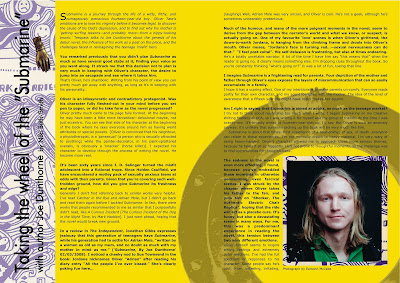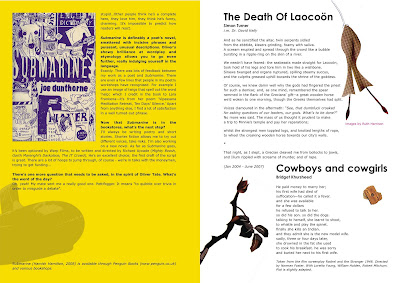

Submarine is a journey through the life of a witty, filthy, and
outrageously precocious fourteen-year-old boy. Oliver Tate’s
ambitions are to lose his virginity before it becomes legal, to discover
the cause of his Dad’s depression, and to find out why his mother is
‘getting surfing lessons—and probably more—from a hippy-looking
twonk.’ Trespass talks to Joe Dunthorne about the genesis of his
debut novel, the influence of his work as a poet on the piece, and the
challenges faced in reimagining the teenage ‘misfit’ hero.
You remarked previously that you didn’t plan Submarine as
much as have several good stabs at it, finding your voice as
you went along. It struck me that this decision not to plan is
very much in keeping with Oliver’s character, the desire to
jump into an escapade and see where it takes him.
That’s Oliver, he’s shambolic. Writing from his point of view you can
pretty much get away with anything, as long as it’s in keeping with
his personality…
Oliver is an idiosyncratic and contradictory protagonist. Was
his character fully fleshed-out in your mind before you set
pen to paper, or did he take form as the novel progressed?
Oliver pretty much came to the page fully formed. At the beginning
he may have been a little more fantastical—delusional maybe, not
just eccentric. You can see that side of his character at the beginning
of the book where he sees everyone around him as having weird
attributes or special powers. [Oliver is convinced that his neighbour,
a physiotherapist, is a ‘pansexual’ (a person who is sexually attracted
to anything) while the painter-decorator, in his paint-splattered
overalls, is obviously a ‘knacker’ (horse killer)]. I expected his
character to develop through the process of writing the novel. He
became more real.
It’s been sixty years since J. D. Salinger turned the misfit
adolescent into a fictional trope. Since Holden Caulfield, we
have encountered a motley pack of sexually anxious teens at
odds with their parents. Given that you’re covering such welltrodden
ground, how did you give Submarine its freshness
and edge?
Generally I don’t find referring back to similar works very helpful.
I’ve read Catcher in the Rye and Adrian Mole, but I didn’t go back
and read them again before I tackled Submarine. In fact, there were
works that people recommended to me as similar that I purposefully
didn’t read, like A Curious Incident [The Curious Incident of the Dog
in the Night Time, by Mark Haddon]. I just went ahead, hoping that
the novel would break new ground.
In a review in The Independent, Jonathan Gibbs expresses
jealousy that this generation of teenagers have Submarine,
while his generation had to settle for Adrian Mole, “written by
a woman as old as my mum, and no doubt as much with my
mother in mind as me.” (‘Submarine, By Joe Dunthorne’
02/03/2008). I noticed a cheeky nod to Sue Townsend in the
book: Jordana nicknames Oliver “Adrian” after reading his
diary entry “All the people I’ve ever kissed.” She’s clearly
poking fun here... Photograph by Eamonn McCabe
(laughing) Well, Adrian Mole was very uncool, and Oliver is cool. He’s not a geek, although he’s
sometimes unbearably pretentious.
Much of the humour, and many of the more poignant moments in the novel, seem to
derive from the gap between the narrator’s world and what we know, or suspect, is
actually going on. One of my favourite ‘love’ scenes is when Oliver’s girlfriend, the
down-to-earth Jordana, is hanging from the climbing frame and drools into Oliver’s
mouth. Oliver muses, “Jordana’s face is turning red…—sexual nervousness can do
that.” “I feel post-coital”. His self-delusion is frustrating, but also at times endearing.
He’s a totally unreliable narrator. A lot of the time I have him say “this means that” when the
reader is going no, it clearly means something else. I’m dropping clues throughout the book. So
you’re constantly thinking “what’s going on?” It was a lot of fun, toeing that line.
I imagine Submarine is a frightening read for parents. Your depiction of the mother and
father through Oliver’s eyes exposes the layers of miscommunication that can so easily
accumulate in a family.
I hope it has a scaring effect. One of my intentions is to make parents un-comfy. Everyone reads
partly for their own character, and my agent identifies with the mother. The idea of the level of
awareness that a fifteen year-old might have really makes her squirm.
Am I right in saying that Submarine is aimed at adults, as much as the teenage market?
I try not to think about readership too much when I write. I began Submarine on my Creative
Writing Masters at UEA, so I was writing it for myself and my group of friends. At the time I was
twenty-two. It’s broadly aimed at fourteen-year-olds up, I’d say. But Oliver is such an anomaly
anyway; it’s unlikely that someone picking up the book will be very much like him.
Submarine is about first times. First experience of a relationship, of sex, of death…everyone
can relate to these experiences. I’m not normally drawn to heavy material, I’m very wary of
being heavy-handed. Oliver’s character allowed me to approach these more serious themes,
because he takes it all so flippantly. He’s not prone to thoughtful moments, so the challenge was
to find opportunities for thoughtfulness.
The sadness in the novel is even more effecting, I found, because you’ve embedded
these moments in otherwise unassuming, even farcical scenes. I was struck by the chapter where Oliver takes his father to the fair, and puts him on “Shocker, The
Authentic Electric Chair Replica”, hoping that the ride will act as a placebo cure. It’s funny, but also a devastating scene in many ways. For me,
this was a predominant experience in reading the novel, this tension between
two very different emotions.
Oliver himself seems to inspire strong feelings and extremely polar reactions. I’ve had the full spectrum of responses to his character. Some people say he’s
cold, cruel, unfeeling, irritating, stupid…Other people think he’s a complete
hero, they love him, they think he’s funny,charming. It’s impossible to predict how
readers will react. Submarine is definably a poet’s novel,
smattered with incisive phrases and puissant, unusual descriptions. Oliver’s
showy brilliance at wordplay and etymology allows you to go even
further, really indulging yourself in the language.
Exactly. There was lots of feedback between my work as a poet and Submarine. There
are even a few lines that people in my poetry workshops have recognised. For example I use an image of twigs that spell out the word ‘help’, which I credit in the book to Lara Frankena—it’s from her poem ‘Vipassana Meditation Retreat, Ten Days’ Silence.’ Apart from anything else, I find a lot of satisfaction
in a well turned-out phrase.
Now that Submarine is in the bookstores, what’s the next step?
I’ll always be writing poetry and short stories. Shorter fiction allows me to try out
different voices, take risks. I’m also working on a new novel. As far as Submarine goes, it’s been optioned by Warp Films, to be written and directed by Richard Ayoade (Mighty Boosh,Garth Marenghi’s Darkplace, The IT Crowd). He’s an excellent choice; the first draft of the script is great. There are a lot of hoops to jump through, of course - we’re in talks with the moneymen, trying to get funding...
There’s one more question that needs to be asked, in the spirit of Oliver Tate. What’s the word of the day?
Oh, yeah! My mate sent me a really good one. Pettifogger. It means “to quibble over trivia in order to misguide a debate”.
No comments:
Post a Comment